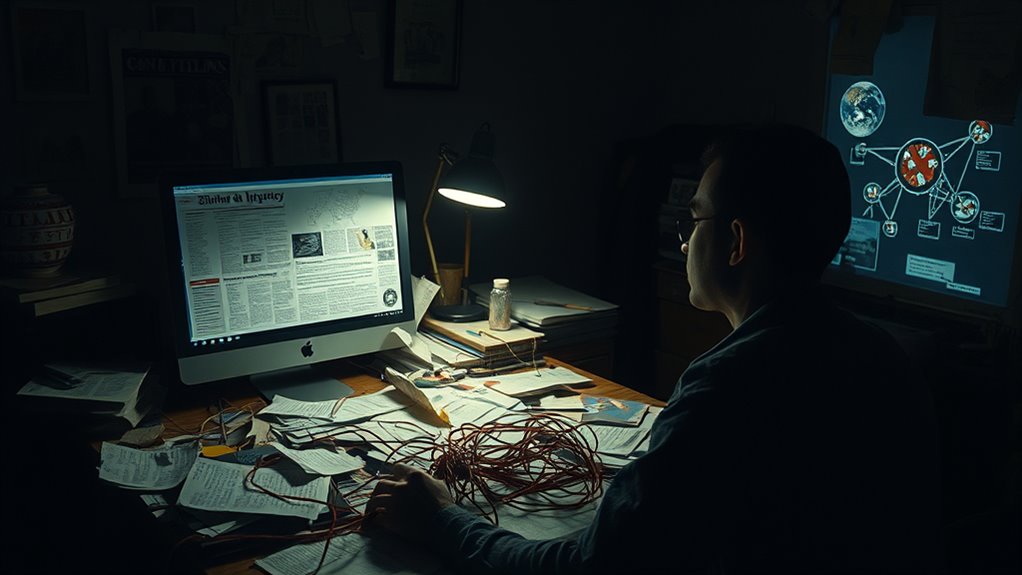You’re naturally drawn to conspiracy theories because they offer simple, emotionally powerful explanations in chaotic or uncertain times. Your mind seeks patterns and certainty, especially when feeling anxious or distrustful, which makes these stories appealing. Social influences and a need to belong also reinforce these beliefs, giving you a sense of control and importance. Exploring further reveals how cognitive biases and emotional factors shape why some people get captivated by these narratives.
Key Takeaways
- People seek simple explanations and patterns to make sense of complex or chaotic events, especially during times of uncertainty.
- Cognitive biases like confirmation bias and proportionality bias reinforce existing beliefs and distort perception of reality.
- Emotional factors such as fear, mistrust, and the need for control make conspiracy theories more appealing.
- Social influences from online communities and algorithms create echo chambers that validate and spread conspiratorial ideas.
- Belonging, identity, and feeling “in the know” provide psychological rewards and reinforce commitment to conspiracy narratives.

Many people are naturally curious about the world around them, but some find themselves increasingly drawn to conspiracy theories. This attraction isn’t random; it often stems from psychological triggers and social influences that shape how you interpret information. When you encounter unfamiliar or complex events, your mind seeks patterns and explanations to make sense of chaos. Conspiracy theories offer simple, often sensational narratives that provide a sense of clarity amid confusion. They tap into your desire for certainty, especially when you’re feeling anxious or uncertain about the future. The psychological triggers behind this attraction include cognitive biases like proportionality bias, where you assume big events must have equally big causes, and confirmation bias, which makes you favor information that supports your existing beliefs. These triggers make it easier for you to accept conspiracy theories because they reinforce your worldview, giving you a feeling of being “in the know” and in control. Additionally, research shows that a tendency toward pattern recognition can lead individuals to see connections where none exist, further fueling conspiratorial thinking. This tendency is often reinforced by the human brain’s natural inclination for causality and storytelling, which can distort perceptions of complex issues. The need for simple explanations can also be linked to cognitive biases that skew reasoning and judgment. Moreover, the human tendency for confirmation bias makes it difficult to consider alternative viewpoints, further entrenching these beliefs. The desire for certainty can also be amplified by emotional factors like fear and mistrust, which drive individuals to seek out explanations that align with their feelings. Social influences play a significant role, too. When you’re part of communities that share these beliefs, it becomes easier to accept and spread conspiracy theories. Social media amplifies this effect, creating echo chambers where you’re exposed mainly to information that confirms your biases. Algorithms tend to feed you content aligned with your interests, reinforcing your beliefs and making alternative explanations seem less credible. Peer influence also matters; if your friends or online groups endorse conspiracy theories, you may feel more justified in accepting them. This social reinforcement can deepen your commitment, making it harder to challenge these ideas even when faced with evidence to the contrary. The desire to belong and be accepted within these groups can sometimes outweigh your critical thinking, especially when social validation is involved. Furthermore, social influences can stem from a need to belong or feel special. When you believe you have access to hidden truths that others are too blind or obedient to see, it boosts your sense of identity and importance. This feeling of being “in the know” can be compelling, especially when you’re feeling isolated or distrustful of mainstream institutions. The combination of psychological triggers—like the comfort of certainty and pattern recognition—and social influences—such as community validation and online echo chambers—creates a powerful pull toward conspiracy theories. Recognizing these factors is essential if you want to understand why some people find themselves captivated by these narratives, often without realizing how much their perceptions are shaped by subconscious biases and external influences.
Frequently Asked Questions
Can Genetics Influence Susceptibility to Conspiracy Thinking?
Genetic predispositions can influence your susceptibility to conspiracy thinking by affecting neurological factors. Your genes may shape brain chemistry and structure, impacting how you process information and trust others. If you have certain genetic traits, you might be more prone to seek out alternative explanations or feel suspicious of mainstream narratives. While environment also plays a role, your genetics can subtly steer your tendency toward conspiracy beliefs.
How Do Cultural Backgrounds Affect Belief in Conspiracy Theories?
While it’s often said that cultural narratives shape our worldview, they also subtly influence your belief systems, guiding how you interpret information. Your background exposes you to specific stories and values that can make you more receptive to certain ideas, including conspiracy theories. When these narratives resonate with your personal experiences, they can reinforce your trust in particular explanations, shaping your perceptions and beliefs more deeply than you might realize.
Are There Effective Ways to Reduce Belief in Conspiracy Theories?
You can reduce belief in conspiracy theories by strengthening your critical thinking skills and improving media literacy. Question what you see and hear, look for credible sources, and avoid jumping to conclusions. When you analyze information carefully, you’re less likely to fall for false claims. Practice these habits regularly, and you’ll become better at discerning truth from misinformation, making you less susceptible to conspiracy theories.
Do Conspiracy Theories Serve Psychological Needs?
Think of conspiracy theories as a safety net, catching you when psychological needs feel unmet. They satisfy your craving for certainty, control, and belonging. Cognitive biases like confirmation bias make it easy to cling to these theories, reinforcing your beliefs. You seek these explanations because they fill emotional gaps, providing a sense of understanding and security amid chaos. Addressing these needs directly can help you see past the illusions.
How Does Social Media Impact Conspiracy Theory Popularity?
Social media amplifies conspiracy theories by creating echo chambers, where you’re exposed repeatedly to similar ideas, reinforcing your beliefs. When faced with information overload, it’s easy to accept simplified explanations that align with your views. Algorithms prioritize sensational content, making conspiracy theories more popular. This environment nudges you toward distrust of mainstream sources, deepening your immersion in these theories and making it harder to find balanced, factual information.
Conclusion
As you navigate the swirling shadows of doubt and certainty, you might notice how conspiracy theories act like a magnetic pull, drawing you into a maze of whispers and secrets. The tangled web of mistrust and curiosity can feel like a storm, yet within it, there’s a flicker of longing for clarity. Understanding this craving helps you see the world more clearly, even as the shadows dance just beyond the edge of your vision.









